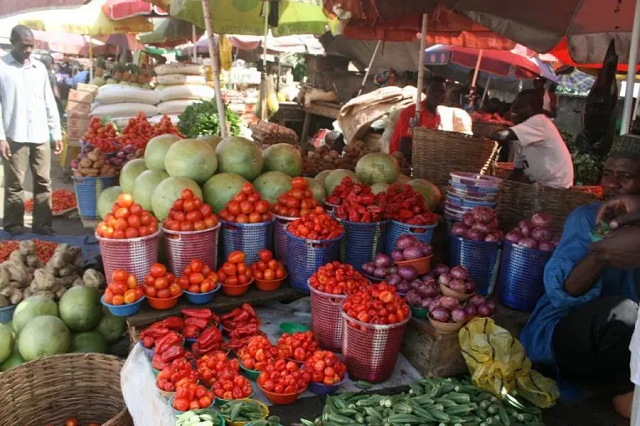The prices of essential food items are rising beyond the reach of Nigerians and this situation is deepening hunger and dragging more people into poverty.
Last year, the COVID-19 pandemic and lockdown affected local food production and farm output, leading to economic instability and loss of jobs.
Loss of means of livelihood for many Nigerians and slashed salaries for others have reduced their ability to buy basic food items, heightening hunger and thwarting cash transfer initiatives of the Nigerian authorities to households and businesses.
Nigeria’s inflation rate has been galloping since last year and rose to a three-year high of 18.17 per cent in March 2021, according to the Consumer Price Index (CPI) report published by the National Bureau of Statistics (NBS).
On a month-on-month basis, the Headline index increased by 1.56 per cent in March 2021, this is 0.02 per cent points higher than the rate recorded in February 2021 (1.54 percent).
The NBS report stated that food inflation soared to 22.95 per cent in March from 21.79 per cent recorded in the previous month.
The rise in the food inflation was caused by increases in prices of bread and cereals, potatoes, yam, and other tubers, Meat, Vegetables, Fish, Oils and fats, and fruits.
According to NBS, non-food items such as cost of transportation and medical services are also pushing up inflation in Nigeria.
READ ALSO: Maize Price Rise By 15% Despite CBN’s Intervention
Findings showed that due to the prevailing economic conditions, many families are constantly hungry, spending more on buying food items and have abandoned savings.
Analysts have warned that with the situation increasingly dire, the future of Nigeria looks bleak as more Nigerians will become poor in the coming months.
Market Price Of Food Soars
Findings by BizWatch Nigeria showed that between March and April, the price of staples such as rice, garri, beans, tomatoes, pepper and flour have surged.
Analysts noted that the situation has further been worsened by the Ramadan fast which started on April 12.
Analysis of market prices of basic food items showed that a 50kg basket of tomatoes increased by 71 per cent month-on-month from N7,000 last month to N12,000 this month.
Also, a 50kg bag of garri increased by 18 per cent in one month from N13,300 in March to N15,700 in April.
Also, the price of a bag of pepper increased by N500 from N7,500 to N8,000 between last month and this month.
A 50kg bag of red beans (Oloyin) now sells for N30,000 as against N24,000 last month, recording 25 per cent price gain.
In addition, a 50kg of local Nigerian rice which was sold for N25,000 last month now sells for N27,000, indicating 8 per cent price increase.
Also, a 50kg bag of flour gained N500 in one month from N14,500 in March to N15,000 in April.
“Also inducing the rise in prices is the planting season scarcity and the cross elasticity of demand for substitutes of imported products,” Analysts at Financial Derivatives Company Limited said.
Poor Working-Class Nigerians On the Rise
The macro-micro estimation made by the World Bank more working- class Nigerians who live in urban centres will become poor due to the COVID-19 crisis.
Precisely, the banks said that 10 million Nigerians could be pushed into poverty by the economic effects of the COVID-19 crisis alone.
READ ALSO: Banks Rejects Loan Applications To Reduce Bad Debts, Says LCCI
The bank had estimated that the poverty headcount rate or the national poverty line—would remain virtually unchanged at a little over 40 per, although the number of poor people would be set to rise from 82.9 million in 2019 to 90.0 million in 2022 due to natural population growth.
However, due to the economic effects of the COVID-19 crisis, the national poverty rate was revised and projected to jump from 40.1 per cent in 2019 to 45.2 per cent in 2022, implying that 100.9 million Nigerians will be living in poverty by 2022.
Data from the NBS National Longitudinal Phone Survey (NLPS) reinforced this prediction as it suggested that despite many Nigerians’ subsequently returning to work, many households’ incomes are lower than last year and they are more food insecure.
Way Forward
To cushion the effects of the COVID-19 crisis on the economy, the Nigerian government has helped many businesses to pay the salaries of 319,755 employees.
Also, 265,425 beneficiaries received Artisan and Transport Support from the government while 172,129 business names were registered free by Corporate Affairs Commission (CAC).
However, this is not enough as many experts have advised the government to address insecurity in food-producing states in the country.
The Director-General, Manufacturers Association of Nigeria (MAN), Segun Ajayi-Kadir, said the government should stimulate growth in agricultural output.
He added that more support of the government is needed in the manufacturing sector to guarantee improved output and the reduced the intensity of too much money chasing after fewer goods. The DG called on the government to deliberately and partner with the productive sector to grow non-oil export.













